Seek Alternate Route #3: Music Research Library
In which we discuss searching for samples and sounds, adventures in international crate-digging, and the importance of a continuous learning mindset.
After a busy couple of months we’re back with the next installment of Seek Alternate Route! Continuing the trend set by my conversation with Olympic Records, I decided to meet up with another mainstay of my record hunting and musical discovery history: the fellas at Music Research Library.
I first visited MRL in 2020 at their original location in Providence’s Olneyville neighborhood — just ring a wireless doorbell on a nondescript old warehouse, climb a flight of stairs, walk down a long hallway, and you’d find yourself in crate-digging heaven. With a focus on the obscure, from niche jazz and foreign film soundtracks to entire bins of Bruton and KPM library music, I’ve never left MRL without broadening my horizons and hearing something new.
I had the chance to drop in and visit co-owners Zachary Warf and Vasyl Kochura at their new digs in Beacon Hill, where they celebrated MRL’s second Boston anniversary at the start of March. It was great to catch up with Zach and Vas and learn more about their experiences as music seekers, listeners, curators, and creators.
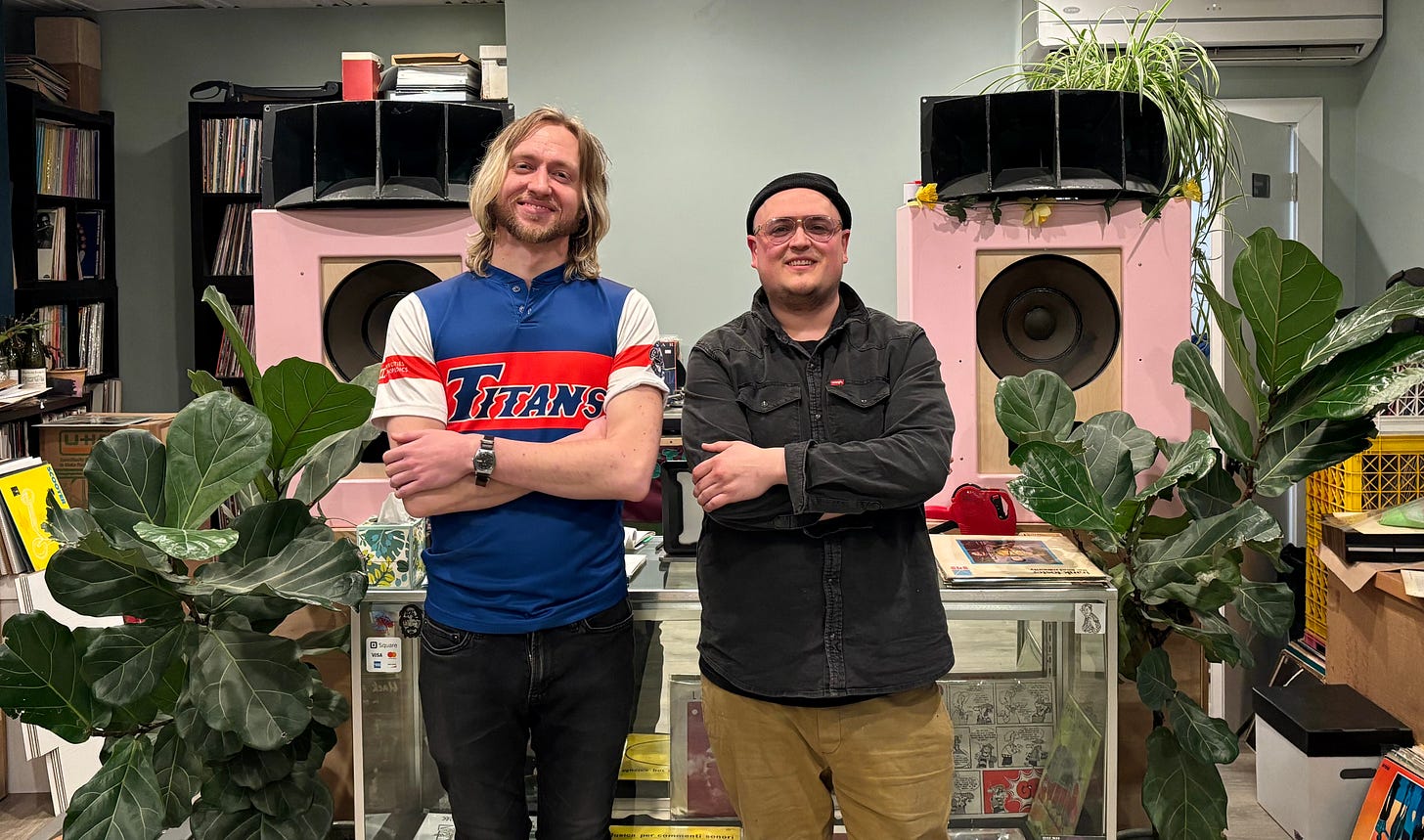
Seek Alternate Route Talks with Music Research Library
I dropped into Music Research Library late on a sunny spring afternoon. To be more specific, I visited the day before the South Boston St. Patrick’s Day parade — famously the best time to drive into the city and find reasonably priced parking, but that’s on me for the lack of foresight.
I was met with a number of fellow patrons as I entered the shop, some flipping through the shelves while others tested their picks at the listening stations. The late day sun poured in through the large picture windows, each adorned with the shop’s hypnotic “spiral-in-square” logo, as groups of green-clad parade preppers happily stumbled on by.
After chatting with Vas at the counter, he offered to let me conduct my interview in the shop’s subterranean storage room to help minimize any interruptions and background noise. I made my way downstairs to a basement bursting with backstock records just waiting to be priced and shared with the masses. Zach offered me a seat on an overturned milk crate while he leaned on one of the few empty shelves available, and we dove into our conversation.
(I spoke with each of the owners individually while their counterpart manned the register upstairs — what follows is a combination of these two conversations, woven together through common questions and themes.)
On Their Introduction to CDs and Vinyl Records
Seek Alternate Route: I don’t think I’ve actually ever asked either of you this before, but what was it that first got you into physical media? Was there some kind of inciting incident, or was it a more gradual process?
Zachary Warf: I grew up in the early 90s, and my parents were pretty young and hip. They both had pretty decent CD collections with all types of music, you know, rock, metal, a lot of contemporary stuff. Not as much funk and soul, but a lot of rock and things around that. So it was definitely CDs at first.
Vasyl Kochura: I would drag my mom to the CD store growing up. In high school, I was buying a lot of music that I was discovering on the Internet and the radio. For me, that was groups like Fall Out Boy and the Foo Fighters, you know, artists that were kind of up and coming at the time. I would hear a song and then go to the store and buy the new CD, and I eventually amassed this huge CD collection. Down the line, maybe six or seven years later, was when I started to try to get all my favorite CDs on vinyl.
SAR: What was it that made you want to switch from CD to vinyl?
VK: You would buy the CDs, but you kind of knew that vinyl was the ultimate way to connect with the artists you loved. Picking up a record from your favorite artist felt like it was the most personal and tactile way to have that connection as a fan of the music. So for me, I was always thinking ‘Oh, I would love to have this on vinyl one day.’ And I didn't even have a record player, but I knew I would eventually.
ZW: Yeah, I think getting into hip hop is what helped me really start digging for records. But also being a musician, you know, when I got to a certain age, I think that inspired me to seek things out and find all these old records that you wouldn't ever find on CD or even think to pick up otherwise.
On Musicianship & the Search for Samples
SAR: You mentioned being a musician — I know you two are both part of the jazz-fusion group Zamova with Zach on drums, Vas on the guitar, and a couple of other collaborators on keys and bass. Did you start exploring and learning these instruments at a young age?
VK: It started in middle school for me. I always looked up to my older brother, and he was into Nirvana and Stone Temple pilots and that kind of stuff. He had a guitar that was just sitting in our closet — one day I was just like, oh, I'm gonna take this out and try to learn a song. And the first song I learned was something by U2, I think U2’s “One.” From there I just wanted to keep learning how to play some of my favorite songs. Once I got to high school I got a lot more into music, and it just became a much bigger part of my life. Listening to music, going to tons of concerts, learning guitar, and having people to play with helped me keep upping my skill level. So yeah, it was something that I picked up because it was just sitting around, but it became an irreplaceable part of me.
ZW: When I listen to music I'm inspired by so much, whether it makes its way into my own music or not. Sometimes I might hear something that makes me think ‘Wow, that's a really cool technique,’ or some really great progression or melody that would be cool to try out in my own way. But as a kid, I was really looking for loops and samples to play over the drums. I figured the drums were kind of the easy part. So I would find great drum sounds and just do the classic ‘play my own drums over samples’ type thing to learn.
SAR: Outside of their impact on your playing, did searching for samples have any effect on the things you were discovering and listening to?
VK: We were always chasing that feeling of discovery, searching for an understanding of how different pieces of music fit together. With samples specifically, there were things that we grew up listening to like A Tribe Called Quest and Big L — hearing samples from those records on other records that we found sparked that kind of drive to seek out more music with the same DNA or in the same realm. We both come from musical backgrounds, so we were hip hop listeners that got into production. And then eventually we became more interested in the search and the discovery aspect of record digging.
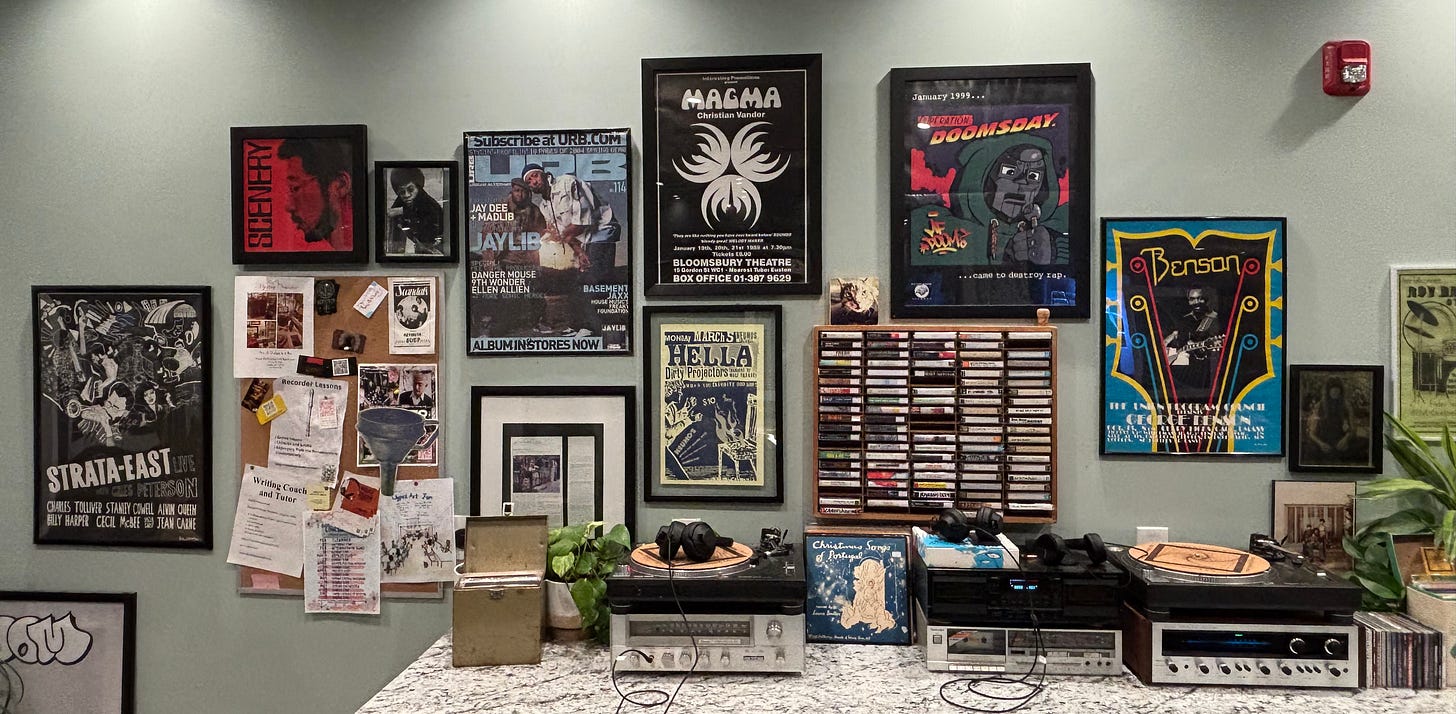
On The Trip that Spawned a Record Store
SAR: On the subject of record digging, I’m curious what your journey looked like from those sample-sourcing and collecting days to where you guys are now. Was there a specific moment that made you decide ‘Hey, we should open our own shop?’
ZW: It took a while. We lived with each other at one point, and we got our collection started by going out every couple of days and coming back with a big box of records. We’d just go and buy sixty $2 records, bring them back to our place, and check them out. I also used to travel for work, and I would buy records literally everywhere I went. After six or seven years of aimlessly buying records like a madman, you accumulate a lot. I think my personal peak was somewhere around 7,500.
SAR: Holy shit…
ZW: It was all sorts of stuff. It was everything that I had bought since the beginning. Memories good, bad, all sorts of weird stuff, gifts from people. But I think it wasn’t until around 2014 that me and Vas started going to record shows and all these little yard sales where people were selling records. And we were inspired, thinking ‘Why don't we have one of these little punk shows of our own?’ So we set it up at the Black Market Yard Sale by Boston Hassle, and we would bring doubles of the albums that we had multiples of. And then we realized that it was actually pretty fun. We were selling a bunch of cool records and buying more records. It was an awesome chase.
SAR: So that’s when you decided it was time to open up shop?
ZW: Well first we went on this huge record trip to Europe with a couple of our best friends. We went to England, we went to Portugal, we went to Spain, we went to Italy. It was killer. And when we were in Europe, we realized how many more record stores there were, how much more music of all ages and genres was being appreciated and purchased in the physical format. Here, everything’s a little bit more on the go, everybody wants things to be digital — which is fine. It's totally cool. But out there, it was very much old school. There were one or two record stores in every district, and it was fantastic to see.
SAR: Oh man, I can imagine. That sounds like the dream!
ZW: We came back and I already had that spot that you know as 62 Dike Street [in Providence] rented. I just used it as storage and a band room. When we came back, it was already completely filled with records, so I said to Vas, ‘Why don't we just use this room as the record store?’ And that was it. A couple of months later, November 1st, 2016, we decided to open up and make it happen.
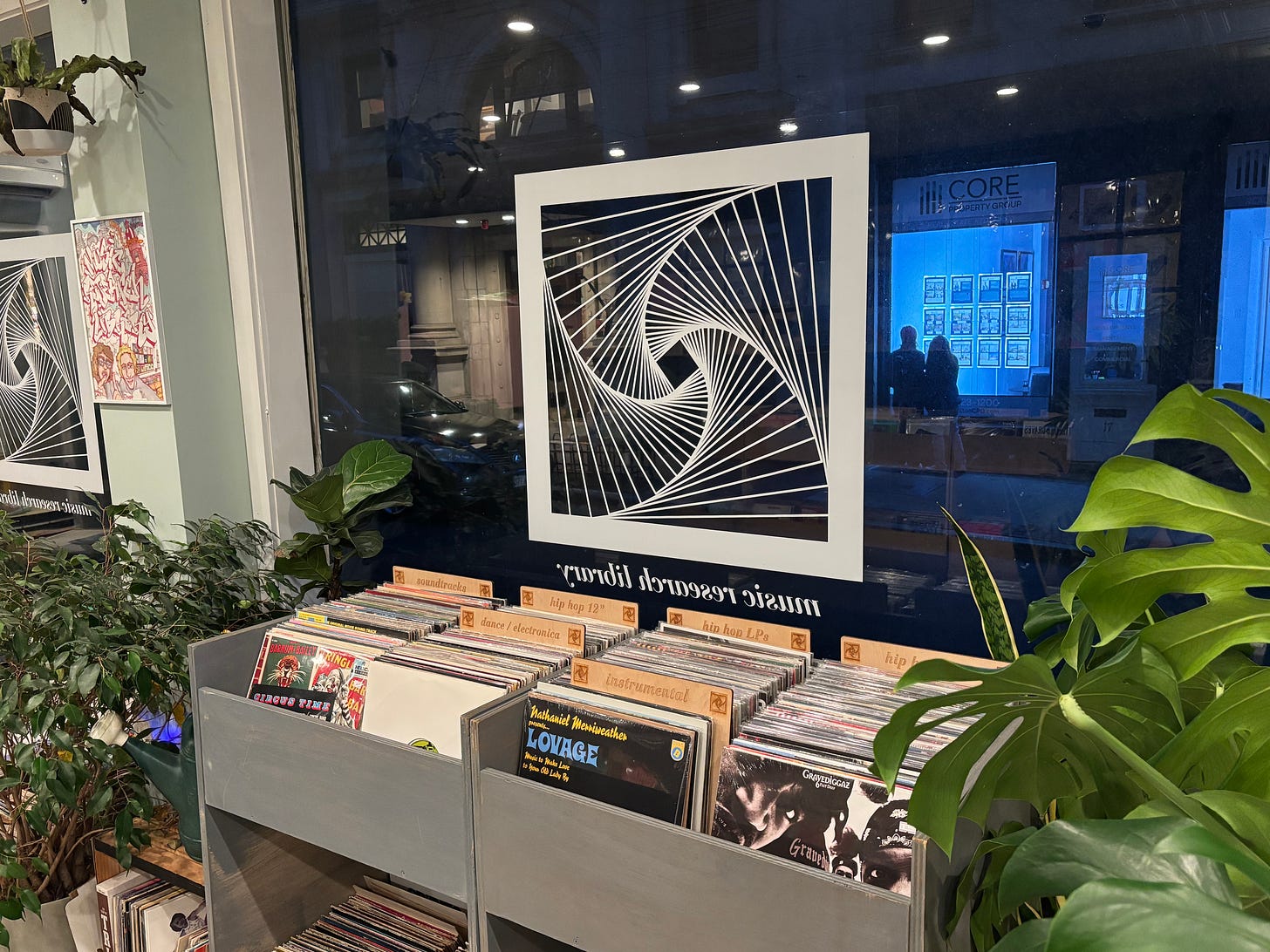
On Curating and Creating as a Collective Effort
SAR: Between the Providence spot and this new location, you guys have been running MRL together for a while now — almost ten years! Something I’ve noticed in my own creative pursuits is how often they can end up feeling a bit individualistic. Like even if you’re part of a larger community of fans of an artist, genre, series, whatever, it’s easy to approach discovery as a solo mission rather than a communal act. What does being part of a duo — and a trio/quartet in Zamova — bring to the creative experience? Do you feel like you’re influencing each other, still bringing your own tastes to the table, or maybe a bit of both?
ZW: We definitely align on the things we like. I think that's a big part of why we're friends. It’s also the fact that, with any friend, you have situations where you learn from each other about new things that you might like or you might not. But you also learn to respect what other people like, even if it’s not in your personal wheelhouse.
SAR: So it’s kind of a mixed bag? Some stuff crosses over, other stuff might not be for you, but you still get the chance to check a lot of it out regardless?
ZW: Yeah, I think that's one really cool thing about running this shop. I've been working in retail pretty much since I was a young teenager, so I've always been very customer-focused. I think here, since we actually run the shop, it really means a lot to us to care about what other people like. We can't always get everything, but we get an overall census of what cats dig. There's a million things you could deal on, and that's why you you can't do everything. But you know what you can expect from us here — it's a lot of instrumental music, a lot of jazz, a lot of general 70s, 80s types of tunes.
SAR: That’s actually a great segue into another question — how hands on is your role in curating the shop’s selection? Are you guys super intentional with what you seek out and put on the shelves in order to fit this shared taste?
VK: Yeah, I think for us, we started off just collecting records together and selling the ones that we didn’t listen to anymore. So the shop will always be a reflection of our own taste — and any shop, I think, is a reflection of the owner or owners in the sense that it sells things that they like. People sometimes like what we like, but it's definitely not for everybody. If you don't love something, though, it's really hard to present it as authentic. Because you can't say you specialize in something and then just not really be into it — I mean, I guess you could, but it would be really hard to connect with people.
ZW: A lot of the stuff we like doesn't turn up all that frequently, unfortunately, so we do have to seek it out. And like any record store, we have our pros and and cons depending on someone’s opinion. But I have to say that probably about 80% of what we do here is hands in the streets, very hard work on our behalf. We travel a lot. But I can’t complain, because this is amazing. We love doing it. It's literally what I’m here to do.
VK: And a lot of times it's like people like you that are also record nerds and enthusiasts. That's usually the kind of people that we connect and resonate with — but it's also great to see people that would not normally discover that type of music just get to encounter it, maybe get intrigued or enchanted by it, and then really dive deeper into it.
SAR: So it’s partially being able to share and communicate your own taste, but also just getting to provide an opportunity for people to explore and discover things for themselves? Is that right?
VK: It's very rewarding on a spiritual level to be able to share music in a way that resonates with someone. And I feel like you can't really have that type of connection in any other way except in a record store. I mean sure, I’ve discovered tons of music online. Whether it's streaming or blogs, different online communities, there are really great ways to discover music. But there's just different types of dialogue that happen in different kinds of circles. So when you step into a record store and enter into a new and unique kind of environment, you'll never see the exact same things. You'll always see something different based on the shop. Whereas with online shopping, things can get cyclical and somewhat echo chamber-y. You really have to search every avenue.
ZW: I was given so much great knowledge and wisdom about music growing up, and I love being able to do that for others whenever I can. Even just having this place for someone to come learn on their own, you know, it’s great. It doesn’t always have to come directly from us. But if anyone asks for a recommendation, I tell them that I’ll talk all day and back, so it’s really about how deep they want to go and how much time they have.
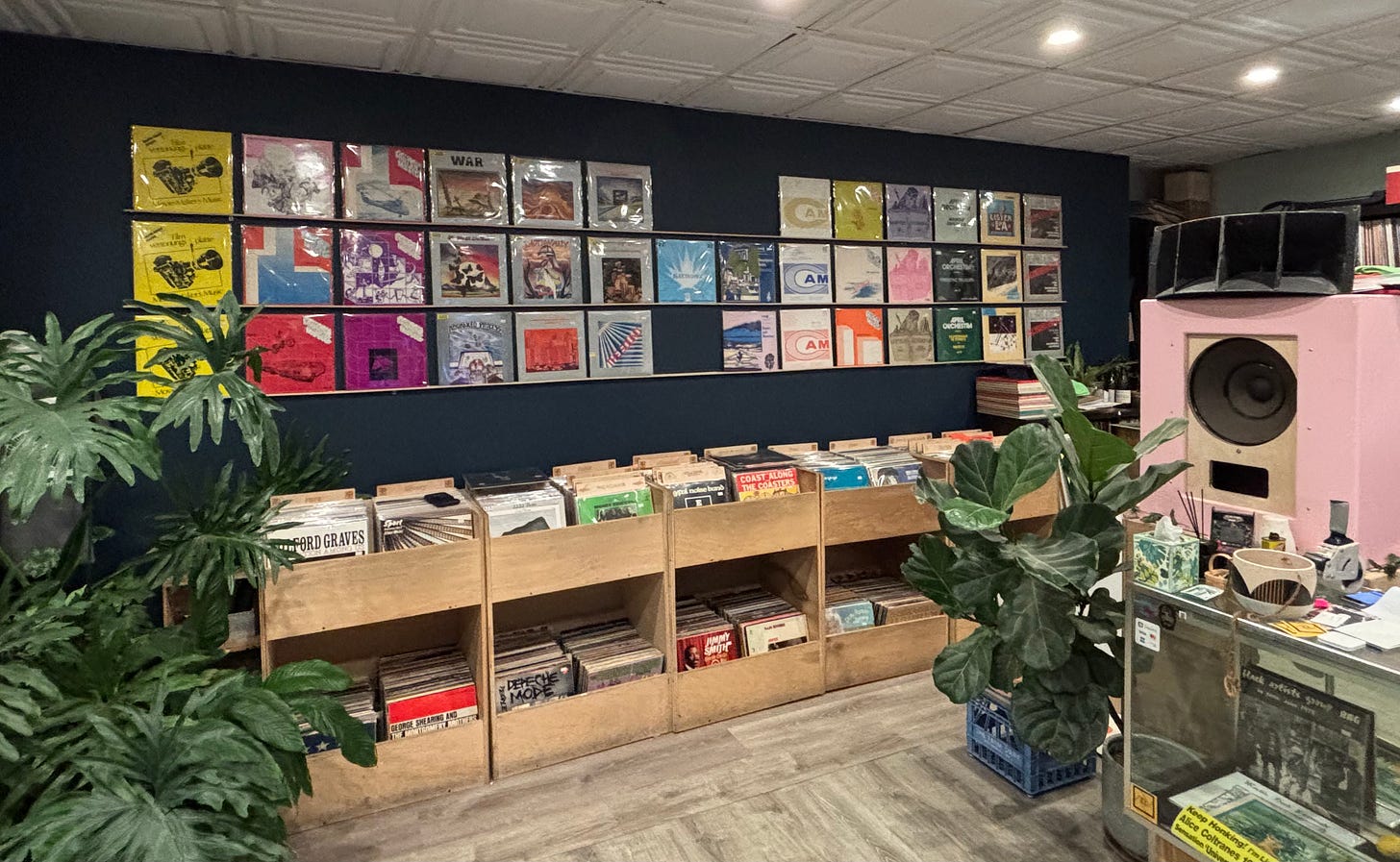
On Listening as a Continuous Learning Experience
SAR: At this point, you've had thousands of records pass through your hands, both as individuals and through the shop. Are you still regularly discovering new things? How often are you having those ‘Huh, I’ve never heard something like this before’ moments?
ZW: Honestly, we're still learning new stuff every day. That's one thing we've always reiterated through the name of our shop: the Music Research Library. If you don't want to do any research on something then you won't learn anything about it. But if I decide to go into this box of records right now and put something on, we’re both gonna learn something new. Even if we don't like this classical ‘70s choral record, if we really sat here and skipped around, we'd find at least one thing that we think is interesting or intriguing. And we’d learn something that we’d never have known if we hadn’t picked up the record. That's so cool to me.
SAR: Every listening opportunity is a chance to learn something new, or at the very least be able to tell if you like something or not.
ZW: Yeah, but also, what is that? That's just one person’s opinion, you know? That's why you gotta play records with your friends, because everybody gets a different experience out of them. Sometimes you gotta think for yourself, sometimes you gotta see what other people think. For me, I'm learning something every day. And I think other people are too when they come down here to the shop.
SAR: So it sounds like the key is to be openminded about what you’re listening to, to get outside of your comfort zone and actively seek out different kinds of music.
VK: It's just a matter of how open you are to listening to new things. There's new songs and new sounds to be explored all the time. But it's kind of like with food, where sometimes you're feeling adventurous and want to try a new restaurant, but other times you just want something that makes you feel good. Music can do that as well. You just have to make sure you’re staying open and adventurous.
SAR: Got it, so more of a balance between staying engaged with the things you know and open to the things you don’t.
VK: I mean, that's part of life, right? You have to be open to experiencing things in different ways; it's something that you won't really know until it happens. Sometimes when people walk into a record store or they hear a type of music for the first time, those moments become special and create a lasting impact or make a really core memory. I mean I have memories of music that’ll never go away because of the specific moment that I first heard it. Whether it's live, on a record, or you're going through something emotional where a piece of music kind of helps you get through it, those things are really powerful.
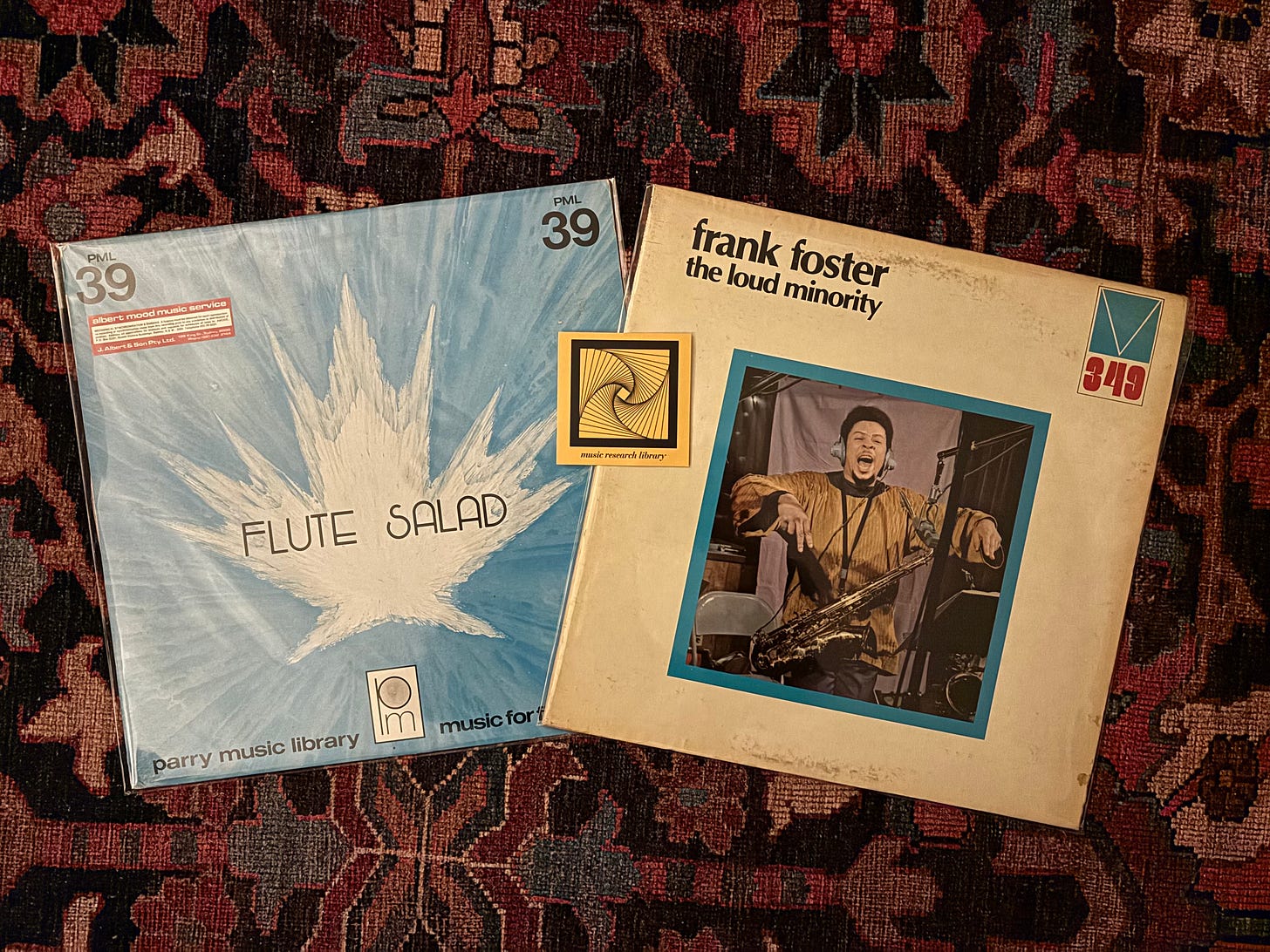
MRL’s Recommendations for Staying Creative
After our chat, I asked Zach & Vas what tips they had for staying invested in creative pursuits. Their recommendations include:
1. Believe in Yourself (Zach)
First and foremost, you should believe in yourself. As an artist, you’re often your worst enemy or your biggest critic. You watch other people you're inspired by, and you hear and see so much great stuff, and it’s really easy to become critical of yourself. The top priority is to try not to be so hard on yourself — it’s something I still work on every single day, as an artist and as a person. I understand that in today’s world people want to be seen, they want to be liked, whether it’s on social networks or in a community. But at the end of the day, you gotta just do what you love because you love it.
2. Do Some Non-Creative Things Too (Vas)
Doing things that don't relate to or have an immediate connection to creative lifestyles actually helps those lifestyles. It's a weird way to think about it, but when I'm doing things that aren't making music I’ll come up with ideas much more easily than when I'm trying to create in a studio or writing environment. I guess you could say it’s just having an enriching life, you know? Eat good food, try to exercise and have your body and mind feel good, go out and breathe and smell some nice flowers.
3. Connect with Other People (Zach)
When you make something that's shareable everyone gets something out of it. Music is such a great way to do that, even with people that you feel like you have nothing in common with. We get all sorts of people coming in here that like all different types of stuff, you know? You might talk to your uncle or someone where you’re like ‘Hey, I don't really know anything about this guy.’ But you can ask what kind of music he listens to, and the conversation can run from there. It might help you talk with him a little bit different, and you might learn something from each other. Ultimately, I feel like music is one of the better things people can talk with each other about.
4. Make Sure to Travel (Vas)
Traveling is very important, especially for cultivating an open minded personality. You just want to experience things that aren't immediately in front of you, bring those experiences back home, and see what happens, see how that changes you. Zach and I did our big Euro trip right before we started the shop, and by the time we came back it was very clear that this is what we wanted to do. It all came from that trip.
5. Create for the Sake of Creation (Zach & Vas)
ZW: Create because you want to create. Just do it because you want to do it, even if no one sees it. Because if you want to put something out there, that’s reason enough to go for it. And I think that’s really cool.
VK: I think anybody can create something meaningful, even if you're not a creative person. It doesn't have to be perfect, just creating something that sends a message for the world, sends out some sort of signal, that’s what’s key.
Huge thanks to Zach and Vas for taking the time to sit down and talk with me at the shop. Located at 24 Joy Street on Beacon Hill in Boston, Music Research Library is open from 11am-7pm every Tuesday-Sunday. You can check them out on Instagram at @yungvinyl and dig into their (Madlib approved!!) jazz fusion soundscapes at @zamovayo.




Nothing but complete heat as per usual